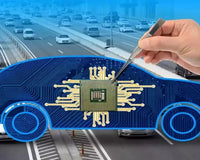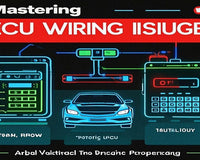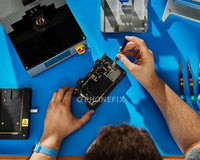In today's highly technological automotive industry, automotive chips have emerged as the unsung heroes powering the innovation and functionality of modern vehicles. These tiny yet incredibly powerful components are control functions like fuel injection, anti-lock braking systems (ABS), airbag deployment, navigation, and entertainment systems.
What are Automotive Chips?
Automotive chips, also known as automotive semiconductors, are integrated circuits specifically designed for use in vehicles. They are engineered to meet the unique demands of the automotive environment, which includes extreme temperature variations, high levels of vibration, and strict reliability requirements.
What are the types of automotive chips?
Automotive chips are mainly divided into four categories: functional chips (MCU, MicrocontrollerUnit), power semiconductors, memory chips and sensors.
1. Microcontrollers: are among the most common automotive chips. They are small, self contained computer systems on a single chip. They are used in a wide range of automotive applications, from controlling the power windows and door locks to more complex tasks in ECUs.
2. Power semiconductors: are responsible for managing and controlling electrical power in vehicles. They are used in electric and hybrid vehicles to convert direct current (DC) to alternating current (AC) for the electric motors and vice versa.
3. Sensor chips: are designed to detect physical quantities such as temperature, pressure, acceleration, and light. In automotive applications, temperature sensor chips are used to monitor engine coolant temperature, transmission fluid temperature, and cabin temperature. Pressure sensor chips are used in tire pressure monitoring systems and to measure fuel pressure in the fuel injection system.
4. Memory chips: are essential for storing data in vehicles. They are used in ECUs to store calibration data, diagnostic trouble codes, and software programs. In car infotainment systems, memory chips store maps for navigation, music libraries, and user specific settings. 
What are the functions of automotive chips?
1. Engine Control.
Engine control units (ECUs) rely on chips to manage various engine functions. These chips monitor sensors that measure parameters such as engine speed, throttle position, and oxygen levels in the exhaust. Based on this data, they adjust fuel injection, ignition timing, and other critical engine operations to optimize performance, fuel efficiency, and emissions.
2. Safety Systems.
Chips play a crucial role in safety - related automotive systems. For example, in anti lock braking systems (ABS), chips process data from wheel speed sensors. They calculate the optimal braking force for each wheel to prevent skidding during hard braking.
3. Advanced driver - assistance systems.
ADAS like adaptive cruise control, lane keeping assist, and automatic emergency braking are made possible by automotive chips. These chips process data from cameras, radar, and lidar sensors. They can recognize objects such as other vehicles, pedestrians, and road markings, and then make decisions to assist the driver or take over certain driving functions in specific situations.
4. In-car infotainment system.
Chips power the in car infotainment systems that provide navigation, music, hands free calling, and internet connectivity. They handle tasks such as processing high definition video for the infotainment display, running complex operating systems, and managing wireless communication protocols like Bluetooth and WiFi.
What is the main reason for the shortage of automotive chip?
The 2025 automotive chip shortage stems from multiple factors, including infrastructure costs and geopolitical events. Additionally, there is increased vulnerability to natural disasters, shortages of raw materials and talent, and a persistent supply-demand mismatch exacerbated by the ongoing demand for advanced electronics like AI and 5G. While the predicted shortage may not be as severe as previous crises, these structural challenges continue to impact the availability of automotive chips.
Trends in the Automotive Chip Industry.
The automotive chip industry is witnessing significant growth due to increased reliance on semiconductors driven by advances in autonomous, connected, and electric vehicles. Analysts predict strong market growth, estimated to reach $88 billion by 2027, with a focus on high-performance computing chips. Key trends include electrification, autonomy, connectivity, and mobility as a service, which are reshaping the industry. The market is expected to grow at a compound annual growth rate of 8.1% from 2023 to 2030, as automotive electronics become more prevalent in vehicles.
In conclusion, automotive chips are an integral part of modern vehicles, enabling a wide range of functions that enhance performance, safety, and user experience. As the automotive industry continues to evolve, the role of automotive chips will become even more critical, and the industry will face both challenges and opportunities in meeting the demands of the future.
Everything You Should Be Aware of Regarding Automotive Chips: A Deep Dive









